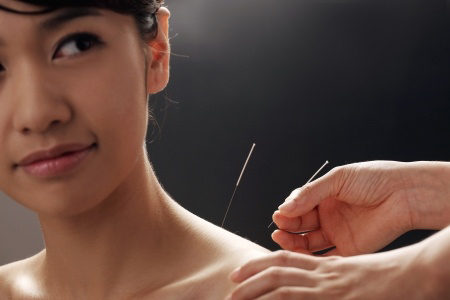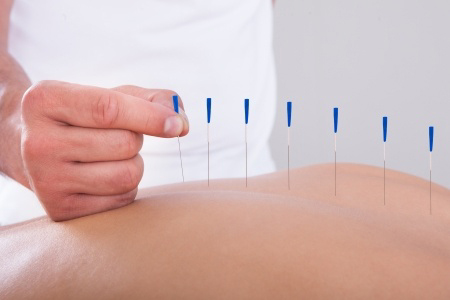|

Of the modalities in the vast Traditional Chinese Medical repertoire, acupuncture is probably the most well known. It consists of inserting thin needles into specific points on the body's network of meridians to regulate the flow of Qi (energy).

Choosing Points: A Chinese Medical Perspective
The choice of points is very different from the common Western approach of choosing a pharmaceutical to address a specific complaint. Instead, it follows a logical system whose view of the body differs from that of Western medicine. For example, for a headache, the acupuncturist might needle point LI-4 on the hand. While there is some truth that LI-4 empirically treats headaches, this "point A goes with disorder Z" mentality will generally only treat symptoms. However, the acupuncturist hopes also to address the root of the problem: is the headache due to a constricted blood flow in the head? Or is it excess blood flow? Is it due to trauma? Is it accompanying the common cold? Acupuncture is a means of coaxing the body to rebalance itself, so that it eliminates the source of a given health problem. In this case, LI-4 directs Qi upward while having a strong effect on the entire head and face. In addition, if for example, the source was due to poor circulation to the brain, we might also needle DU-20 on the vertex to bring Qi and Blood upward and SP-10 above the knee to improve circulation. Therefore, an intrinsic logic, based upon an understanding of a disorder, guides the selection of points.

How does it REALLY work?
Traditionally, the Chinese believed that health disorders could arise from or cause a blockage in the flow of Qi. Acupuncture was thought to open these blockages and promote smooth movement of Qi. In addition, specific points were thought to have special functions, including the nourishing of blood, relaxing of muscles, etc.
From simple observation, the ancient Chinese noted clear physiological responses from acupuncture. Shallow needling in the skin could promote local blood circulation, causing a redness around the needles. And insertion into "trigger points" could cause tense muscles to relax.
With the advent of technologies that objectively measure the body's processes, several modern acupuncture theories have arisen. One theory is that Qi is actually bioelectric energy, generated by cellular function. Research in China has shown that acupuncture points have strong concentrations of ions, supporting this theory. As such, needles could be influencing this magnetic field. Another idea, known as the "gate theory," assumes that the body can only take but so much stimulation, and that the needle sensations help block out pain in other parts of the body. However, this idea does not explain why acupuncture also treats diseases other than pain. Other research has proven that the stimulation of alpha nerve fibers causes endorphins-chemicals that create a sense of euphoria-- to be released in the brain. CAT scans have also shown that acupuncture not only stimulates the sensory parts of the brain, but other areas as well.
|
Acupuncture FAQ
What should I wear to a treatment?
Loose clothes that allow easy access to your arms and legs. If you require needling on your back, abdomen, or chest, we will provide towels to serve as blankets to keep you warm.
How long will each appointment last?
Set aside one hour for the interview, treatment, and counseling session.
How early should I arrive?
PLEASE BE ON TIME. We offer a grace period of 15 minutes. Past that time will be considered a late cancellation. Before your first visit, please arrive 15 minutes beforehand to fill out paperwork.
Do you have a cancellation policy?
Yes. Please cancel at least 24 hours in advance. Full payment will be expected for late cancellations.
|


